-

新人教版高中英语必修3Unit 4 Space Exploration-Reading For Writing教学设计一
另一方面,其余的人反对这个计划,因为它可能会导致一些不好的影响。7.I hold the belief that space exploration not only enable us to understand how the universe began but also help us survived well into the future.我坚信探索太空不仅能够使我们了解宇宙的起源而且能够帮助我们更好地走进未来。8.I think we should spend more time and money exploring space so as to provide new and better solutions to people's shortterm and longterm problems.为了给人类的短期和长期问题提供更新和更好的解决方法,我认为我们应该花更多的时间和金钱来探索太空。9.From my point of view,it is wrong of young people to depend on their telephones too much,which may do harm to both their physical and mental health.在我看来,年轻人过度依赖手机是不对的,因为它们可能会对他们的身心健康都有害。最近你班同学就“人类是否应该进行宇宙探索”这个问题进行了激烈的讨论。有人认为,探索宇宙不仅让人类更好地了解宇宙的发展,还可以用来指导农业生产,以及把一些探索太空的高新技术用于现实生活;也有一些人认为探索太空花掉了大量的人力物力;影响了人们的生活水平。请你根据以下情况写一篇报告并发表自己的观点。注意:1.写作内容应包括以上全部要点,可适当发挥,使上下文连贯;

新人教版高中英语必修3Unit 5 The Value of Money- Discovering Useful Structure教学设计
Step 3 Meaning1. 过去将来时表示从过去某一时间来看将要发生的动作或存在的状态, 常用在宾语从句中。一般由“would/should +动词原形”构成。She hoped that they would meet again someday. 她希望将来有一天他们能再见面。2. was/were going to+动词原形: 表示过去将要发生或很有可能发生的动作, 常用于口语中, 表示预言、意图或者打算等。He was going to start work the following week. 他打算下星期开始工作。3. was/were about to do: 常用来表示即将发生的动作, “刚要/正要做……”。注意该结构不与任何时间状语连用。I felt that something terrible was about to happen. 我感到某种可怕的事情即将发生。4.was/were to do: 表示“曾计划做某事”, 如果表示“本来计划做某事, 动作没实现”, 则需用 “was/were to have done”。She said she was to have told me about the accident. 她说她本来想告诉我关于事故的事。5.Start, go, come, leave, see, meet等动词的过去进行时: 表示就过去某一时刻而言即将发生的动作。She was coming later. 她随后就来。I had just put on my overcoat and was leaving to visit a friend of mine. 我刚穿上外套要去看我的一个朋友。

新人教版高中英语必修3Unit 5 The Value of Money-Listening &Speaking&Talking教学设计
4. A:We’d like to have someone to say a word at the beginning to welcome the group.B:↙Who?A:We thought that you or Dr.Johnson might do it.B用降调说Who,其意思是问,对方想让谁在开场时致欢迎词。Step 6 Pronunciation---Practice1. Listen to the short conversation and mark the intonation with ↗, ↙ or ↙, ↗. Then discuss with a partner what they intend to convey by using different intonation.Owner: You know what ?↗ It’s a million-pound bank note↙.Waiter 1: Really ?↗(question)Waiter 2: Really !↙(unbelievable and surprised)Waiter 3: Really ?!↙↗(first question then surprised)2. Listen to the conversations. Underline the parts that are stressed and mark the intonation. Then talk about the implied meanings of the responses with different intonations. Listen again and repeat.1) Henry: It’s a nice suit.Owner: Oh, it’s perfect!↙(The intonation means it is very suitable for Henry.)2) Henry: Well, that’s very kind of you.Owner: Kind, sir ?↗(what you said is not right) No, it’s kind of you. You must come whenever you want and have whatever you like. Just having you sit here is a great honour !!↙(welcome you to come again)3)Henry:Well, to be honest, I have none. Oliver:(happily) What luck!(excited) Brother↗, what luck!↙(It means “Didn’t you hear it?”)Henry: Well, it may seem lucky to you but not to me!↗(angry) If this is your idea of some kind of joke, I don’t think it’s very funny. Now if you’ll excuse me, I ought to be on my way.↙(If so, I would leave.)Roderick: Please don’t go↙...(hope Henry can wait for a moment)Part B Viewing and Talking---Describe people’s changing attitudes in a film clipStep 1 Before-listening---Tell the filmYou are going to watch part of the film The Million Pound Bank Note. Look at these photos and guess what happens in the film.

新人教版高中英语必修3Unit 5 The Value of Money-Listening &Speaking教学设计
Step 4: Listen again and decide if the following statements are true (T) or false (F).1 It was the first time Chen Liyan's story was reported. T口 F口2 Chen found 10,000 yuan in a small plastic bag in Taiyuan railway station口 F口3 Wang Zheng apologized to Chen because he couldn't offer her more money. T口 F口4 Chen took out a large loan to cure her daughter, T口 F口5 Wang set up a fundraising website for Chen's daughter after Chen told him about her situation. T口 F口Step 5:After listening, discuss the questions.1 What kind of person do you think Chen Liyan is?Chen Liyan is generous and honest because she returned a large sum of money to the owner.2 Did Chen return the money because she didn't need it?No. She returned the money because it was the right thing to do. Evidence for this is that she refused to accept the reward money because she felt that it had not been earned. 3 Is it common for people to do what Chen did?It depends on the culture. In some countries it is quite common to return money that has been found. In other countries, people believe "Finders are keepers!" 4 How did Wang Zheng feel about the return of his money?He must have been very happy and relieved to have gotten his money back. We know this because he thanked Chen repeatedly and even offered her a reward.5 Why did Ma Dongbao tell Wang about Chen's family?He must have had great sympathy for Chen and her daughter and wanted to help them.'We know this because he arranged help for them. 6 How did the news reporter feel about Chen's actions?The news reporter felt that it showed that money wasn't the most important thing in life. We know this because the reporter told us that this is what Chen believes. and then said, “that's a great attitude to take."

新人教版高中英语必修3Unit 5 The value of money-Reading and Thinking教学设计二
? Could you offer me some kind of work here?? I don’t want your charity, I just want an honest job.? Careless: I landed in Britain by accident.Step 7:Consolidation.? Find Henry? Roderick and Oliver were I .making a bet when they saw Henry, a poor young man. ? Know Henry? About a month ago, Henry was sailing and later he found himself carried out to sea by a strong wind. Fortunately, he 2.was spotted by a ship. And it was the ship that brought him to 3.England? Offer money to Henry ? Oliver and Roderick gave Henry a letter and told him that there was money in it. They 4.persuaded him to accept it, and made him 5.promise that it wouldn't be opened until 2 o'clock.Step 8:Language pointsa large amount of: a large quantity of; a great deal ofe.g. They bought a large amount of furniture before they moved their new house.make a bet: make an arrangement to risk money, etc. on an event of which the result is doubtful.e.g. We made a bet on the result of the match.permit sb to do something: allow somebody to do somethinge.g. My mother doesn’t permit me to ride in the street after it rained.by accident: as a result of chancee.g. I only found it by accident.stare at: look at somebody or something with the eyes wide open in a fixed gaze( in astonishment, wonder, fear, etc)to be honest: to tell you the truth; to be franke.g. To be honest, I don’t think we have a chance of winning.Step7 Homework:What do you think will happen to Henry? Will the bank-note help him or get him into trouble?

新人教版高中英语必修3Unit 5 The Value of Money-Reading and Thinking教学设计一
Everybody wants to get wealth.In today’s material world,making money or becoming wealthy symbolizes a person’s success and capability. Many people just make every effort, pay any price to attain greater wealth. With money,they can buy nice, large apartments in nice neighborhood. With money they can own luxurious cars. Wealth seems to bring all happiness in life.But is wealth the only road to happiness? Not really. There are many things in the world, which are beyond the means of money, such as friendship, love, health and knowledge. People are so preoccupied with struggling for money that they have no time or would not take the time to form or maintain friendship. What happiness can they feel living as lonely miserable creatures without love or friends in the world even if they accumulate tremendous wealth?In my opinion, people can’t do anything without money, but money is not everything. What money will bring you depends on your personal belief and goal in life. If you are kind enough to help others, especially the poor, money is a good thing to you. With it, you can do much more for the benefit of people and your country, and it will add to your own happiness. If you want money just for your own needs, you’ll never be satisfied or happy. In a word,you should have money spent for more people. Only then can money be the source of your happiness.Step 8 Homework4 students in a group, one acts Roderick, one Oliver, one servant and the fourth one acts Henry Adams, then listen to the tape, pay more attention to the difference between American English and British English in pronunciation, stress, tone.

新人教版高中英语必修3Unit 5 The Value of Money-Reading for Writing教学设计二
2. 您能看到, 我头发太长了。You can see that my hair is much too long.3. 无论什么时候, 只要您想回来就回来。Please come back whenever you want.4. 您仅有很少的头发要理! You only have too little hair to cut !5. 为您服务是我的荣幸!It is my honour to serve you!Step 9 Writing(Henry is walking down the street when he sees a sign for a place that cuts hair. He decides to have it cut. )H=Henry B=BarberH: Good afternoon, I’d like to have my hair cut, if I may. (The barber looks at Henry’s hair and continues cutting another man’s hair. ) Er, I’d really like a haircut. As you can see it’s much too long. B: (in a rude manner) Yes, I can see that. Indeed, I can. H: Fine, well, I’ll have a seat then. (He sits in one of the barber’s chairs. The barber turns to look at Henry. )B: It’s quite expensive here, you know! Are you sure you can afford it?H: Yes. I think so. (After his hair is cut, the barber tells Henry how much he must pay. Henry shows the barber the bank note. )B: Why Mr. . . (looks shocked)H: Adams. Henry Adams. I’m sorry. I don’t have any change. B: Please don’t worry! (wearing a big smile) Nothing to worry about! Nothing at all! Please come back whenever you want, even if you only have too little hair to cut! It will be my honour to serve you!Step 10 Pair workExchange drafts with a partner. Use this checklist to help your partner revise his/her draft.1. Are all the elements of a play included and in good order ?2. Do the character use suitable language ?3. Are the stage directions clear and useful ?4. Is the plot clear and exciting enough ?

新人教版高中英语必修3Unit 5 the value of money-Reading For Writing教学设计一
【参考范文】Narrator:(Henry is smiling as he leaves the restaurant. As he is walking down the street, he sees a sign for a place that cuts hair. He decides to get it cut. )H=Henry;B=Barber;R=rude manH:Good afternoon, I'd like to get a cut, if I may. (The barber looks at Henry's hair and continues cutting another man's hair. )Er, I'd really like a haircut. As you can see it's much too long. B:(in a rude manner) Yes, I can see that. Indeed, I can. H:Fine, well I'll have a seat then. (He sits in one of the barber's chairs. The barber turns to look at Henry. )B:It's quite expensive here, you know!Are you sure you can afford it?H:Yes. I think so. (In comes the rude man. )R:Hey you there. I need a haircut quickly. Can you do me straightaway?B:All right, then, get in the chair and I'll see what I can do. R:Thank you. (sits down in one of the barber's chairs)H:Excuse me, but I was here first. Aren't you going to do my hair first?B:This man's in a hurry. H:Well so am I!I insist that you cut my hair first. B:OK, but I'll have to be quick. This gentleman is waiting. H:Thank you. (They both become quiet. After his hair is cut, the barber tells Henry how much he must pay. Henry shows the barber the bank note. )B:Why, Mr . . . (looks shocked)H:Adams. Henry Adams. I'm sorry, I don't have any change. R:You're that Mr Adams! Well,I'm glad I waited or I might never have known it was you. B:Why, Mr Adams, please don't worry!(wearing a big smile) Nothing to worry about!Nothing at all!Please come back any time, even if you only need too little hairs cut!It will be my honour to serve you!

新人教版高中英语必修3Unit 5 The Value of Money-Discovering Useful Structures导学案
4.They were going to find someone to take part in their bet when they saw Henry walking on the street outside.[归纳]1.过去将来时的基本构成和用法过去将来时由“would+动词原形”构成,主要表示从过去某一时间来看将要发生的动作(尤其用于宾语从句中),还可以表示过去的动作习惯或倾向。Jeff knew he would be tired the next day.He promised that he would not open the letter until 2 o'clock.She said that she wouldn't do that again.2.表示过去将来时的其他表达法(1)was/were going to+动词原形:该结构有两个主要用法,一是表示过去的打算,二是表示在过去看来有迹象表明将要发生某事。I thought it was going to rain.(2)was/were to+动词原形:主要表示过去按计划或安排要做的事情。She said she was to get married next month.(3)was/were about to+动词原形:表示在过去看来即将要发生的动作,由于本身已含有“即将”的意味,所以不再与表示具体的将来时间状语连用。I was about to go to bed when the phone rang.(4)was/were+现在分词:表示在过去看来即将发生的动作,通常可用于该结构中的动词是come,go,leave,arrive,begin,start,stop,close,open,die,join,borrow,buy等瞬间动词。Jack said he was leaving tomorrow.
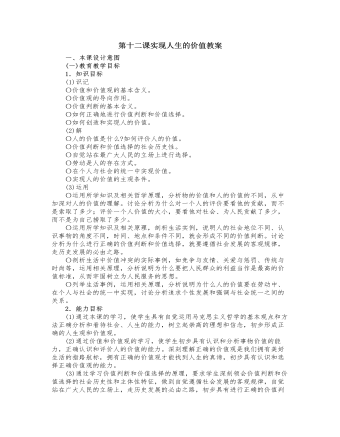
人教版高中政治必修4第十二课实现人生的价值教案
有的学者还指出,要坚持集体主义还必须将集体主义的价值精神与社会主义市场经济的要求结合起来,批判地继承计划经济时代倡导的集体主义,合理地对其进行体系结构的调整和内容的更新,形成新的集体主义。与传统的集体主义相比,这种新的集体主义应具有如下两个主要特点。其一,强调集体的出发点是为了维护集体成员的正当个人利益。传统的集体主义具有片面强调集体至上性、绝对性的弊端;新的集体主义必须依据社会主义市场经济的现实要求,将集体应当对个人承担的义务加以科学的阐释。真正的集体应该维护各个集体成员的个人利益,实现组成集体的各个主体的自我价值。这种新型的集体主义是对社会主义市场经济条件下社会关系的真实反映,既与个人主义有本质区别,也不同于传统的集体主义。其二,要体现道德要求的先进性与广泛性的统一。

人教版新课标高中地理必修2第一章第一节人口的数量变化教案
材料四:印度提倡“只生一个好”——鼓励三人小家庭 生男生女都一样材料五:印度尼西亚《人口发展与幸福家庭法》材料六:我国基本国策 计划生育(小结)通过对以上材料的分析我们可以得出这样的结论,不同的国家应该采取不同的人口政策,对与发达国家来说人口增长缓慢,应采取鼓励生育,吸引移民的措施;发展中国家人口增长较快,实行控制人口的政策已经迫在眉睫。不论是发达国家还是发展中国家共同的目标就是实现环境人口和社会经济的协调发展。【课堂小结】这节课我们主要学习了人口的自然增长,影响人口自然增长的因素有哪些?(人口的自然增长率和人口的基数)世界人口的数量在不同的历史时期表现出不同的特征,同一历史时期的不同地区,人口数量的增长又有不同的特点。面对不同的人口形势,各国应采取不同的人口政策。

人教版新课标高中地理必修2第一章第三节人口合理容量教案
生:环境承载力是指环境能持续供养的人口数量。师:对了。但是有同学仍然会感到这是一个很抽象的概念。下面我们具体来了解什么是环境承载力。我们可以从两个部分去理解:一、环境,它主要是指环境的单个要素(如:土地、水、气候、植被等。)及其组合方式。二、是承载力,它指在特定的条件下,具体某事物能承受的某种活动的最大值。那环境承载力的科学定义是怎样表达的呢?生:环境承载力是指某一时期,某种状态条件下,某地区环境所能承受的人类活动作用的阈值。师:很对。 我们可以用一个生动的例子来说明。一只木桶里面的水的多少在底面积固定不变的情况下是由哪块木板来决定?生:最短的那块。师:确实如此。这就是我们平常所讲的 “木桶效应”。那影响环境承载力的大小也是由环境个要素里面最紧缺的那个要素来决定的。下面我们用一个例子来印证一下。
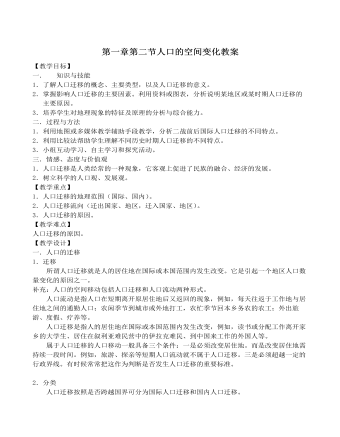
人教版新课标高中地理必修2第一章第二节人口的空间变化教案
1.促使美国成为一个移民国家的因素是:①美洲属于未开发的新大陆,需要大量的劳动力;②欧洲失业工人和破产农民增加,人们为了追求更好的经济待遇迁往美洲;③新航线的开辟为人们顺利迁移扫除了障碍;④殖民扩张是人口迁移的促进因素,加快了人口迁移的过程。导致美国人口在本土范围内频繁迁移的原因,归纳起来有:第一次人口迁移是战争因素,第二次是城市化;第三次是自然环境、经济环境的变化;第四次是经济格局的变化,即西部和南部新资源的发现和新兴工业的发展。2.我国古代的人口迁移,深受统治者及其行政力量的束缚。封建帝王为了加强本国的经济和军事实力,对人口迁移严加控制。只有当战乱发生的时候,这种控制才得到削弱,人们为了躲避战乱,寻找安定的生活环境,不得不进行大规模的迁移。我国近几十年的人口迁移主要是由生产资料和劳动力数量上的地区分布不平衡造成的,是经济因素在起主导作用,与古代的人口迁移截然不同。
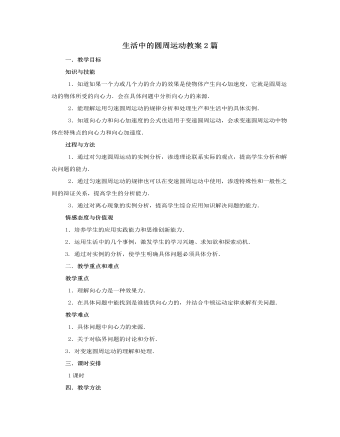
人教版新课标高中物理必修2生活中的圆周运动教案2篇
思考:洗衣机脱水时转速高时容易甩干衣物,还是转速低时容易甩干衣物?(2) 制作棉花糖的原理内筒与洗衣机的脱水筒相似,里面加入白砂糖,加热使糖熔化成糖汁。内筒高速旋转,黏稠的糖汁就做离心运动,从内筒壁的小孔飞散出去,成为丝状到达温度较低的外筒,并迅速冷却凝固,变得纤细雪白,像一团团棉花。5.离心现象的防止在水平公路上行驶的汽车,转弯时所需的向心力是由车轮与路面的静摩擦力提供的。如果转弯时速度过大,所需向心力F大于最大静摩擦力Fmax,汽车将做离心运动而造成交通事故。因此,在公路弯道处,车辆行驶不允许超过规定的速度。当高速转动的砂轮或者飞轮内部分子间相互作用力不足以提供所需向心力时,离心运动就会使他们破裂,甚至酿成事故。
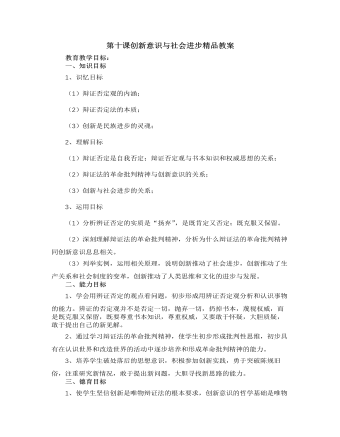
人教版高中政治必修4第十课创新意识与社会进步精品教案
在数学上,0这个数是解决记数和进位问题而引进的概念,由于它不能表示实在的东西,很长时间人们不把它看作是一个数。认为0是无,是对有的否定。从唯物辩证法的观点看,这种否定不是形而上学的简单否定,而是具有丰富内容的辨证否定。辨证的否定是发展的环节。0是从无到有的必经之路,是连接无和有的桥梁。0又是正数和负数之间的界限,它既否定了任何正数,也否定了任何负数,是唯一的中性数。但它又是联结正数和负数的中间环节。没有0,负数就过渡不到正数去,正数也休想发展到负数来。数学中的0是对任何定量的否定。如果没有这一否定,任何量的发展都无从谈起。这个否定不是一笔勾销,而是扬弃。因为它克服了任何定量的有限性,成为其发展的环节。在现实生活中,0作为辨证的否定,也体现出联系和发展的性质。如0度不是没有温度,而是非常确定的温度。
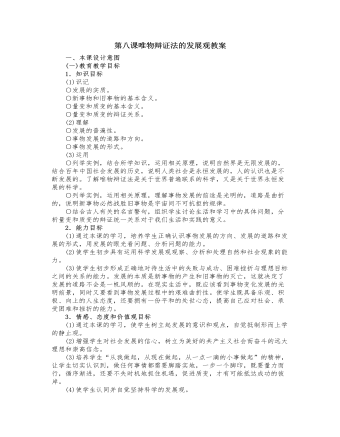
人教版高中政治必修4第八课唯物辩证法的发展观教案
1973年4月的一天,一名男子站在纽约的街头,掏出一个约有两块砖头大的无线电话,并开始通话。这个人就是手机的发明者马丁,当时他是摩托罗拉公司的工程技术人员。这是当时世界上第一部移动电话。1985年,第一台现代意义上的可以商用的移动电话诞生。它是将电源和天线放置在一个盒子里,重量达3公斤。与现代形状接近的手机诞生于1987年,其重量大约750克,与今天仅重60克的手机相比,像一块大砖头。此后,手机的“瘦身”越来越迅速。1991年,手机重量为250克左右。1996年秋,r出现了体积为100立方厘米、重量100克的手机。此后,又进一步小型化,轻型化,到1999年就轻到了60克以下。手机的体积越来越小,但功能却越来越多。以前的手机是用来通话的,现在的手机是用来享受的。今天,手机可以是相机、游戏机、音乐播放器、信用卡、电影院……手机带来的不仅仅是通信方式的改变,更是生活方式的变革。
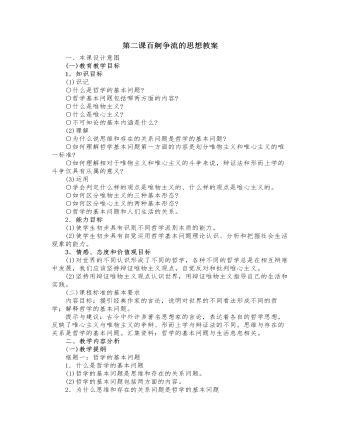
人教版高中政治必修4第二课百舸争流的思想教案
不可知论是否认人们认识世界或彻底改造世界的可能性的哲学学说。此概念首先由英国的赫胥黎(1825—1895)于1869年提出,不可知论的思想在古代就已产生,欧洲近代的主要代表是休谟和康德。其本质是把人的感觉看作是主观和客观之间的屏障而不是桥梁,不承认在感觉之外有确实可靠的客观外部世界的存在,不懂得认识过程中本质与现象、有限与无限的辩证关系。对不可知论最有力的驳斥是实践。有时不可知论一词也用以专指针对宗教教义而提出的一种学说,认为上帝是否存在、灵魂是否不朽是不可知的。2.二元论二元论是认为世界有两个本原的哲学学说,与一元论相对立,它把物质和意识绝对对立起来,认为物质和意识是两个各自独立、相互平行发展着的实体,谁也不产生谁,谁也不决定谁,都是世界的本原。它的观点是错误的:它肯定精神不依赖于物质而独立存在,这本身就是唯心主义的观点;它虽然承认物质是独立的本原,但在说明物质和精神的关系时,又把精神说成是唯一具有能动性的力量,必然倒向唯心主义。主要代表人物是法国的笛卡儿和德国的康德。
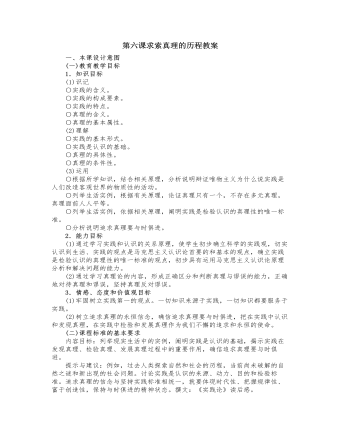
人教版高中政治必修4第六课求索真理的历程教案
农业科学的周期是以年为时间单位,一次实验就要等到一次花开、结果。就这样,几个实验误导了袁隆平好几年。这时登在《参考消息》上的一篇不起眼的文章像给迷途中的袁隆平以当头一棒:克里克、沃森和威尔金斯发现DNA螺旋结构,西方的遗传学研究进入分子水平。“我当时还在那里搞什么无性杂交,糟糕得很”。水稻是自花授粉植物,雄蕊雌蕊都在一朵花里面,雌雄同株,没有杂种优势一杂种优势是生物界的普遍现象,小到细菌,大到人,近亲繁殖的结果是种群的退化。但是水稻因为花小,其杂交是当时公认的世界难题,设在马尼拉的世界水稻研究中心就是因为困难重重,差点关闭。袁隆平偏不信这个邪,他突发灵感:专门培养一种特殊的水稻品种——雄花退化的雄性不育系,没有自己的花粉,这样不就可以做到杂种优势了吗?于是,漫长的寻找过程开始了,要找到这样一株雄花退化而且杂交之后产量猛增的“太监”水稻简直是大海捞针。
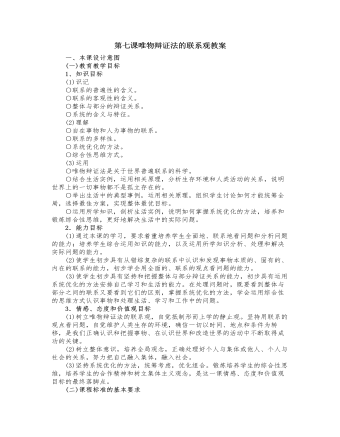
人教版高中政治必修4第七课唯物辩证法的联系观教案
2.能力目标(1)通过本课的学习,要求着重培养学生全面地、联系地看问题和分析问题的能力;培养学生综合运用知识的能力,以及运用所学知识分析、处理和解决实际问题的能力。(2)使学生初步具有从错综复杂的联系中认识和发现事物本质的、固有的、内在的联系的能力,初步学会用全面的、联系的观点看问题的能力。(3)使学生初步具有坚持和把握整体与部分辩证关系的能力,初步具有运用系统优化的方法安排自己学习和生活的能力。在处理问题时,既要看到整体与部分之间的联系又要看到它们的区别,掌握系统优化的方法,学会运用综合性的思维方式认识事物和处理生活、学习和工作中的问题。3.情感、态度和价值观目标(1)树立唯物辩证法的联系观,自觉抵制形而上学的静止观。坚持用联系的观点看问题,自觉维护人类生存的环境,确信一切以时间、地点和条件为转移,是我们正确认识和把握事物、在认识世界和改造世界的活动中不断取得成功的关键。

人教版高中政治必修4第三课时代精神的精华教案
此探究活动的目的是为了说明马克思主义哲学是科学完整的体系。在探究活动时可以首先向学生简单介绍西方哲学的发展历史,使学生对马克思主义哲学在整个西方哲学中的位置和地位有个大致了解。离开了这个大的背景,学生对马克思主义哲学就容易摸不着头绪。马克思主义哲学之前的唯物主义的局限性表现在:古代朴素的带有辩证法性质的唯物主义主要是追问世界的本原问题,这时的哲学缺乏近代科学作为基础,因此它更多的是一种猜测。它虽然看到了世界的联系和变化,但它还无法理解联系和变化背后的基础和原因。近代形而上学的唯物主义主要是追问人的认识问题,即人的认识的来源是什么,是什么保证人的认识的可靠性。但它对人的认识问题的解决主要是立足于对世界的一种直观观察,认为人的认识来源于对世界的直观的、机械的反映。它不理解人的实践活动,不理解人是在改造世界的过程中认识世界,人的认识是在实践基础上的能动反映。